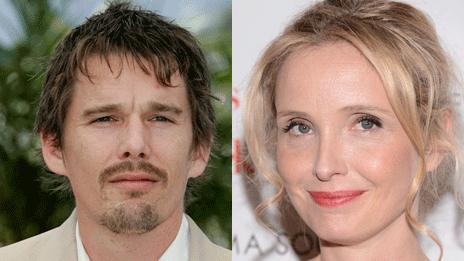Linklater's epic 12-year journey back to Boyhood
- Published
Boyhood was filmed in short instalments over 12 years with the same actors
Director Richard Linklater has long defied being boxed into prescribed Hollywood genres. His eclectic catalogue of films, including Slacker, Dazed and Confused, School of Rock and the Before trilogy lay testament to a creative mind open to playing with subject matter, format and time frames - and pushing boundaries.
Yet, his latest independent film, Boyhood, would seem a groundbreaker too far, even for him.
On the face of it, Boyhood seems conventional enough - a story of a boy's journey from childhood to young adulthood.
But factor in its epic 12-year shoot and Boyhood is clearly far from run-of-the-mill.
For the audience, Boyhood is a conventionally manageable experience of just over two hours.
However, the usual capsule shoot was replaced by annual short, sharp bursts of filming with the same central cast - played by Patricia Arquette, Ethan Hawke, Ellar Coltrane and Linklater's own daughter Lorelei - from 2002 to 2013.
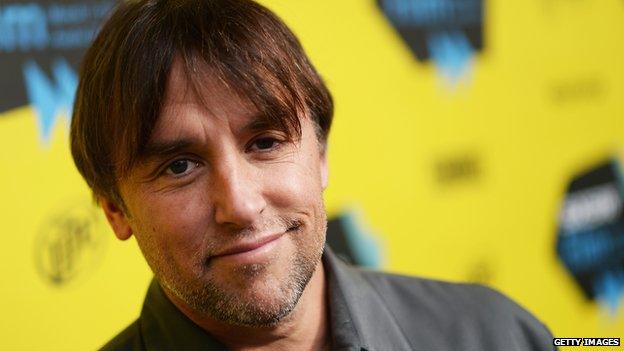
Richard Linklater says he's telling Mason's story from the perspective of his own memory of growing up
The result is a film that truly covers 12, often rollercoaster, years in the life of a family - albeit fictional - and specifically the evolution of the central character Mason, played by newcomer Coltrane, whom we do literally see grow up from the age of six to 18.
Linklater's says his motivation was simply that he wanted to make a film about the experience of childhood. But he was floored by how to do this given the vastness of the territory.
"Why not try to encompass it all?" says the director by way of explanation for what he went on to do. "It was like taking a great leap of faith into the future."
Innocent though it sounds, Linklater's query seems to gloss over the unpredictability of life and what might happen to the film's stars along the way.
But you'd be wrong, says the director.

Mason's sensitive nature leads him to retreat into his own space quite often
"I'm a calculated risk taker. My dad was in the insurance business and his job was to assess risk and look at the statistics. So I see the world that way.
"We've got five people - the four family members and me - and statistically I could have insured that we would have all been here 12 years on from the start of the project.
"But just being alive poses numerous risks every day. How do you know something traumatic isn't going to happen that will change your life?

Olivia, played by Patricia Arquette, is devoted to her children but has to do her own growing up before she can be a proper mother
"And then there is the 'unknowness' of the future. What if Ellar turns out to be this horrible, awkward actor, what if, what if, what if…..
"But I had faith in my ability to adjust the film a little bit every year, to work within the reality of my four ageing cast members as well as changes in culture and society.
"It was a collaboration with the future."
The story follows the dreamy Mason as he struggles to grow up and find an identity within an ever-fluctuating home and social environment.
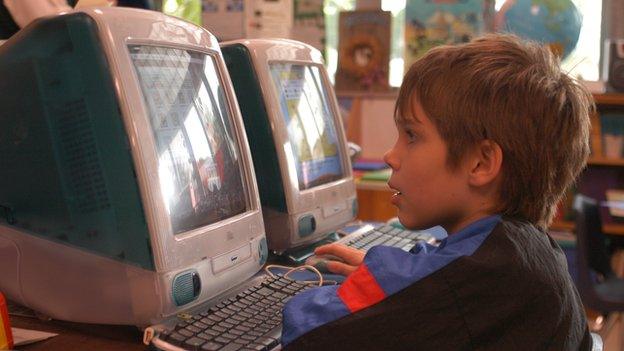
The audience sees Mason take on the challenges of a fast-moving social landscape
An absent father, house moves, financial hardship, the bad relationships of his mother, and an overbearing older sister - played by Lorelei - are all thrown Mason's way. And as he grows into adolescence, the inevitable angst of self-image and girlfriends rears its head.
"It's the perspective of childhood as a young boy," says Linklater. "Mason's sister is represented well but as you come to the centre of your own life, your parents and your siblings and all these other forces that have been controlling you fall away and you gain more agency so the film mirrors that. Mason becomes the star of his own show."
Though scripted, there's a fluidity and naturalistic feel to the narrative and dialogue and action. The biggest artifice in the film is the soundtrack, carefully chosen songs - many by Coltrane - to reflect the era onscreen.
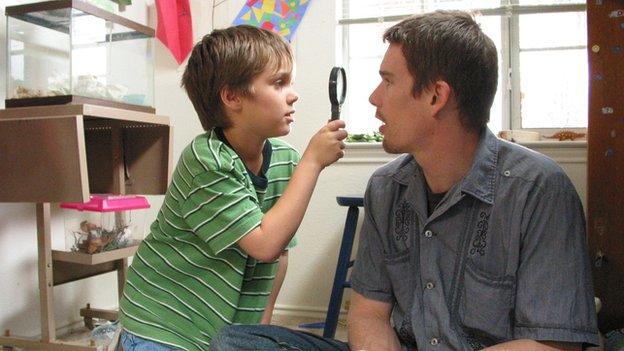
The relationship between Mason and his father has to be rebuilt as Mason Sr tries to make up for being feckless and absent at the very start of Mason's life
Conversations often seem improvised and the changes in the appearance of the central characters give Boyhood the pathos of a fly-on-the-wall documentary.
It's an impression accentuated by the lack of "bells and whistles" moments as Linklater's eye is firmly on the day-to-day minutiae of human life.
This, he says, is the stuff that ultimately makes us who we are.
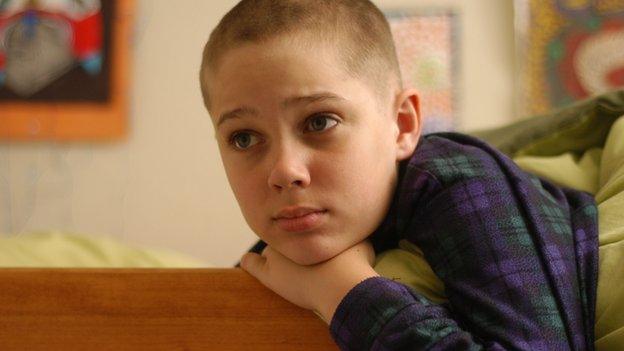
Mason's sometime traumatic domestic life leads to one particularly brutal haircut from his mother's latest ill-chosen boyfriend
"I give myself a long time to go through ideas to get things right and get rid of the bad stuff. Hollywood doesn't. If this had been a 'Hollywood' film, it would have gone on things like the first kiss and it would have used swelling music.
"But I wanted to avoid all that and work the way your memory works for reasons you don't fully understand. A distillation of the essence of life is how I see cinema.
"I'm a minimalist, I get close to life and don't remember all the big stuff, I remember this detail or moment. So this is my memory and personal experience of this subject."
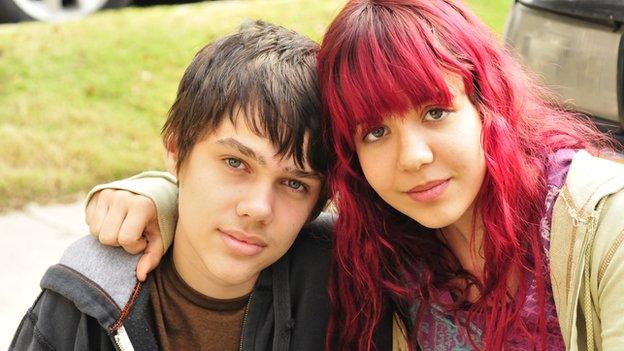
Mason's relationship with his sister Samantha calms down as they both grow up and find their own identities
But this is not Michael Apted's Seven-Up TV documentary series. This is fiction.
Given this dichotomy, and the unprecedented contract, it's a wonder Linklater managed to lockdown his central cast.
Yet, both Hawke, who plays the one-time absent father Mason Sr whose trying to make amends, and Arquette - struggling mum Olivia - were unequivocal in their support.
"They came on board immediately, I trust artists and they said, 'What a cool idea'. They saw the possibilities and jumped in. They didn't have a perspective on the 12 years," says Linklater.
Hawke's past work with Linklater on the Before trilogy explains his trust in the director. But Medium star Arquette was taking a risk, particularly as a woman facing the prospect of seeing herself age on screen.
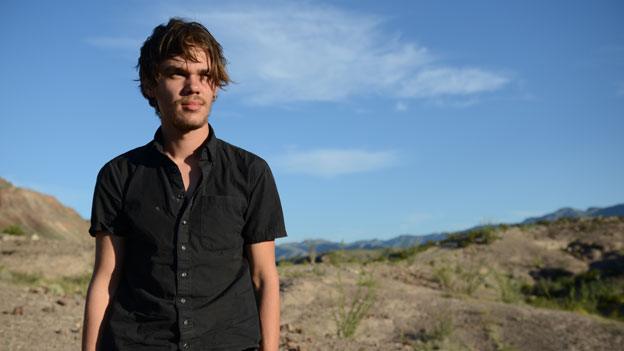
Mason grows up and goes off to college as an individual in his own right
"Patricia is fearless and didn't mind," says the director. "She put in a fearless performance. There's not a lot of vanity. She'd say: 'It's a Saturday morning, I wouldn't be wearing make-up, I don't want to wear it.'"
When it came to finding the actor to play Mason, Linklater had a tougher task. After seeing a lot of what he calls "normal, parent pleasers", Linklater hit upon Coltrane.
"He was unusual and different and came from an unconventional artistic background and was mostly home-schooled. He was the most interesting of all those I saw. He wasn't coming out of any cookie cutter," says the director.
"He was his own guy but I liked his thought process, he was like he is now, mysterious, ethereal and he sees things in a unique way."
And as he grew older, Coltrane added his own ideas to Linklater's and the script was tweaked accordingly along the way.
Linklater seems to have an instinct for potential. He has previous form in giving Oscar-winners Matthew McConaughey and Ben Affleck their early breaks in Dazed and Confused.
And, says the director, it's an innate fascination in human nature and the essence of life that drives his film-making. It's an ethos Linklater builds upon as Boyhood unfolds and ultimately leaves you with.
"You've just seen an epic but every moment is distilled down to 'it's always right now'. Many religions and disciplines are trying to reach the goal of appreciating the moment.
"The film had a positive effect in advancing Ellar's spiritual maturity. It made him realise that so much of what he was doing was capturing moments and living in the moment. That is what the film is about."
Boyhood is released across the UK on Friday 11 July.
- Published6 September 2012
